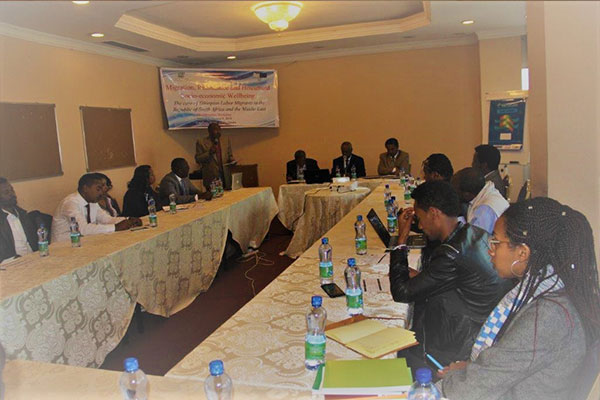FSS Executive Director Dr. Yeraswork Admassie (standing) welcoming the workshop participants
ADDIS ABABA-Forum for Social Studies (FSS) in collaboration with the International Organization for Migration (IOM) conducted a workshop on Thursday August 9th 2018, at Desalegn Hotel, to disseminate the results of the research conducted by FSS on the theme of migration, remittance, and their socio-economic impacts.
The workshop was organized to provide a forum for evidence based discussion and deliberation by concerned stakeholders, including government policy makers, International organizations, civil society practitioners, academics and the media. The workshop began with the welcoming remarks of Dr. Yeraswork Admassie, the new Executive Director of FSS in which he emphasized the importance of the research topic given the current high rate of labor migration from Ethiopia to the two destinations and the need to generate evidence based knowledge for policy making. He added his hope that valuable inputs that would enrich the research findings will be generated in the discussion to follow. He thanked participants for making the time to come and attend this workshop. He also thanked IOM for funding the research project and expressed his gratitude to the entire IOM staff for the close cooperation and assistance provided to FSS in implementing the project.
Following this, Mr. Malambo Moonga, the IOM Migration Management Unit Program Coordinator, delivered the official opening speech of the workshop, highlighting the issue of migration and remittance as one of the important issues of concern and areas of engagement for IOM. In closing, he wished the participants fruitful discussion and declared the workshop open. The workshop hosted two presentations in as many separate sessions followed by a chaired discussion session. The first presentation was made by Dr. Zerihun Mohammed, a senior socio-economic researcher at FSS. Dr. Zerihun started his presentation by recognizing the contributions of FSS staff involved in the research project and thanking them for a well-done job. Dr. Zerihun’s presentation focused on the project background, the objectives of the research and the methodology used in the study. Dr. Zerihun also dealt with the various factors that contributed to the increase in the volume of migration over the last two or so decades. He also spoke at length on the need to explore this situation in order to forward policy inputs to IOM and the Government of Ethiopian Government. Moreover, Dr. Zerihun outlined the study methodology employed by the research: The field sites, methods of data collection for the study.
The second presentation by Dr. Asnake dealt with key findings of the study and policy recommendations. Dr. Asnake first gave as background, a description of the global remittance flow and socio-economic impacts, so as to set the stage for the presentation and discussion of the remittance flow into Ethiopia and its socio-economic impacts.
He said that, recently, remittance flow to Ethiopia has become significant in terms of total volume as well as the attention it acquired among policy makers. Although reliable data is hard to come by, the World Bank estimates the remittance flow to Ethiopia, as having increased from $27 million in 1995 to $53 million in 2000 and as having reached 387 million by 2010, averaging 1.3% of GDP in 2009. The major regions that are sources for remittances by Ethiopians more or less correspondence with the major migration destinations — namely, North America, Gulf countries, and Europe — he explained.
Following the presentations, a lively discussion on the issue of migration with especial emphasis on remittance and its use by recipient families ensued. Among others, participants indicated that the social and economic impact of remittance is a matter of concern to the Government of Ethiopia and its development partners such as IOM, and that a close collaboration and partnership among stakeholders is of paramount importance to make the best out of remittance both at the family and national level.
The meeting was well attended by participants from government offices, the civil society, international organizations, local banks, higher educational institutions, and the media.
Following the established tradition of FSS, the research report presented at this workshop will be improved upon the basis of inputs garnered from the discussion made by the attending participants and published as a monograph for wider dissemination

